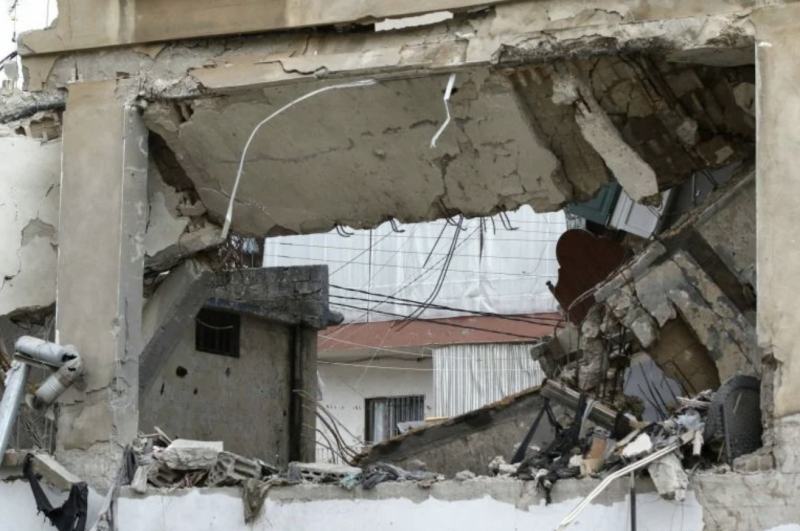
A residential building targeted by an Israeli strike in Nabatieh, Feb.15, 2024. (Credit: Mahmoud Zayyat/AFP)
Wednesday was a bloody day in the town of Nabatieh, directly targeted by Israel for the second time since hostilities between Hezbollah and Israel began on Oct. 8, 2023. After four violent raids on villages near Nabatieh, an attack was carried out in the evening on a residential building in the town, killing at least seven members of the same family and three Hezbollah members who were in the building, according to information obtained by our correspondent from security sources.
The evening raid was probably aimed at Ali Mohammad Debs, a military official within the party who had escaped a first assassination attempt when his vehicle was targeted on Feb. 8, also in Nabatieh.
‘I'm afraid of losing my job’
Nabatieh, with a population of around 120,000, is one of the largest in southern Lebanon and the capital of the mohafaza (of the same name). Home to numerous shops, schools and universities, the town is an important stronghold for Hezbollah, which has a large popular base there.
The latest violence in the region represents a dangerous escalation, as Nabatieh is located more than 50 km from the Naqoura region on the border with Israel, whereas up until now clashes have tended to be concentrated in the border area.
With this strike, Israel seemed determined to hit its targets, even if it meant striking deeper, even if it meant civilian casualties.
“The Israeli attack on Nabatieh is a response to a strike carried out on Wednesday by Hezbollah against the Israeli town of Safad, which hit the Israeli army's Battalion 91," retired general Elias Hanna told L’Orient-Le Jour.
This situation worried residents, as a more serious escalation could displace whole swathes of the population; Nabatieh is much more densely populated than the border villages evacuated so far.
“I'm afraid I'll lose my job as a teacher if I leave the city," said Diana, a 30-year-old mother. "For now, I'm staying here. If the situation gets worse, we'll see where we can take refuge," she told OLJ.
Iqbal, another resident of the town, is determined to stay at home. "I'm very scared, but I'm going to stay here. I think they'll stick to calculated responses," she said.
American and Iranian ‘constraints’
Despite the unprecedented nature of the Nabatieh strikes, Hanna downplayed the impact of these incidents and ruled out any possibility of the war spreading to other Lebanese regions.
"There are constraints put in place by the United States in this war. The Israelis have a certain margin of freedom, but they can't go very far either," said the former military officer.
The same goes for Hezbollah, which has reportedly been told by Iran to calm down. "Iranian Diplomatic Chief Hossein Amir-Abdollahian’s visit [last week] to Lebanon also served to calm the situation" on the south Lebanon front, he added.
To Hanna, Wednesday's strikes are part of an "escalation before de-escalation."
"With everything that's happening in Gaza, Israel can't extend the war to the southern Lebanon front. It is therefore conducting a calculated escalation. Hezbollah, for its part, is launching pre-emptive attacks to protect itself against Israel and dissuade Israel from attacking it once it has finished with Hamas,” he concluded.
This article was originally published in L'Orient-Le Jour.